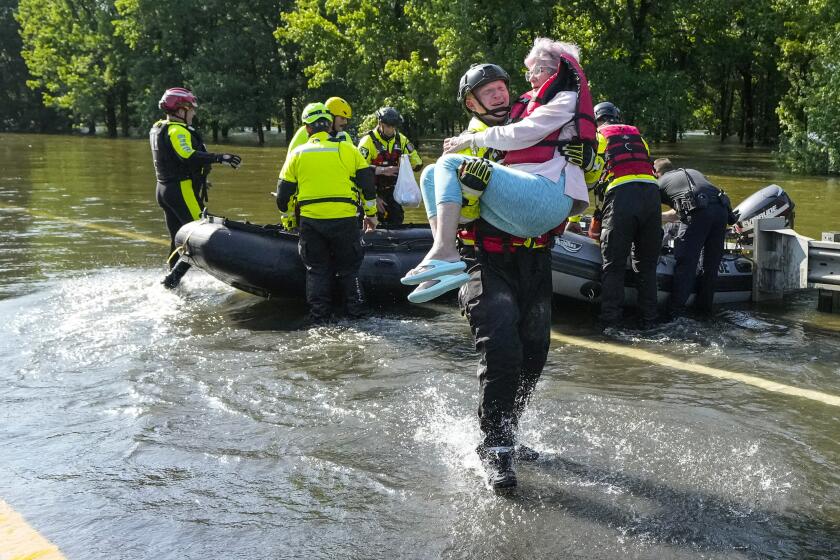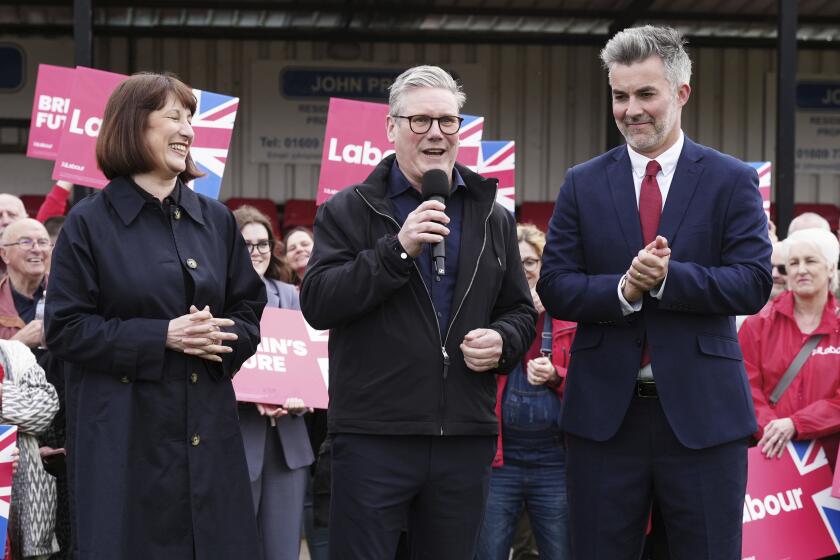Conservative Leading Guatemala Vote
The former mayor of this capital city declared himself president of Central America’s most populous country Sunday after partial election returns showed him with a commanding lead.
With 94% of the vote counted early today, Oscar Berger, 57, a center-right candidate backed by big business, had 55% of the vote, compared with 45% for his challenger, Alvaro Colom, 51, a moderate former vice minister of economics and a factory owner.
Berger, who led by 16 percentage points in polls before the election, declared victory late Sunday in front of thousands of supporters at his campaign headquarters.
Although his campaign was financed by some of Guatemala’s wealthiest industrialists, he promised to govern for all of the nation’s 14 million people. “I am the president of Guatemala to serve all Guatemalans,” he said. “I have received a mandate today from the needy ... to work for the needy and the poor.”
At a news conference earlier in the day, Berger pledged to step up police training to combat crime and to find money for infrastructure projects, including new highways and airport improvements.
Colom, who ran a negative campaign attacking Berger’s intelligence, had not conceded by late Sunday. “We’ll have to wait until the last ballot box, because the results are going to be very close,” he told a local radio station shortly after polls closed at 6 p.m. local time.
Sunday’s vote was the second presidential election since peace accords were signed in 1996, ending the nation’s 35-year civil war. The election took place in relative calm, with a few scattered incidents of violence reported. International observers declared the voting free and fair.
Election officials estimated turnout at about 45%, low compared with first-round elections in November. Then, 58% of the nation’s 5 million registered voters went to the polls to decisively reject the candidacy of former Gen. Efrain Rios Montt, whose dictatorship in the early 1980s marked one of the bloodiest periods of the war.
After that vote, the international community, including the U.S. State Department, celebrated Guatemalans’ decision to turn away from a candidate seen as a symbol of a dark, authoritarian period in the country’s past.
Whether the incoming administration would prosecute Rios Montt for his alleged war crimes remained uncertain Sunday. Human rights groups are suing Rios Montt for genocide in civil court, but as a member of Congress he has enjoyed immunity from criminal charges. Berger has dodged questions about whether he would seek a trial for Rios Montt.
“The political system sent the message that his leadership was over,” said Victor Galvez, director of FLACSO, a social science research center in Guatemala City. Now “we have to hope that ... justice will do its work.”
Rios Montt did not seem worried Sunday. He made a rare public appearance to note that his party, the Republican Front, still has a majority in Congress. And he cryptically praised its performance over the last four years under outgoing President Alfonso Portillo.
It was a “human government. Not of gods or kings or princes,” he told a jostling throng of journalists.
But a fight over justice for long-ago crimes seemed far from the minds of ordinary Guatemalans on Sunday.
Many voters said they simply wanted a change from the perceived corruption that has dogged Portillo’s administration. Several Portillo allies have been accused of pilfering millions of dollars from the state.
“I hope that with these elections we can leave behind the corruption,” said Jose Castillo, an engineer who voted at a school in the capital. “We need an improvement.”
*
Special correspondent Renderos reported from Guatemala City and Times staff writer Miller from Bogota, Colombia.
More to Read
Start your day right
Sign up for Essential California for news, features and recommendations from the L.A. Times and beyond in your inbox six days a week.
You may occasionally receive promotional content from the Los Angeles Times.






